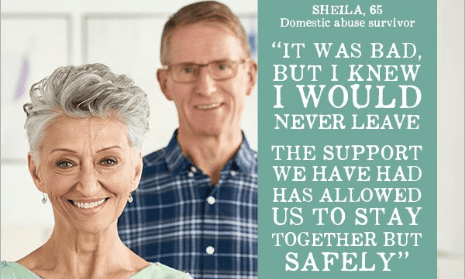Essex police and county council have defended a social media campaign on domestic violence after critics accused it of encouraging survivors to stay with perpetrators.
The police force came under fire on social media after posting a tweet about “Sheila” which told the story of a woman who “knew that the abuse in her relationship was wrong” but the couple had been supported and “stayed together but safely”.
Essex police attracted further criticism after writing on their Facebook page that the stories included people who had left abusive relationships and those who “wanted to stay in a relationship where less harmful abuse was taking place” and had “found safety and happiness doing that”.
The force apologised for its use of “clumsy language” on Twitter: “Our message in this campaign isn’t ‘stay in any relationship no matter how abusive’, it’s ‘if something is happening in your relationship even if you’ve been with someone for decades there is help you can get’.”
The writer and campaigner Jack Monroe had previously tweeted:
Wow, Essex Police. I just... have no words for what an irresponsible, silencing, diminishing campaign this is. Basically telling women to 'put up and shut up' re domestic abuse. In 2017. This is absurd. pic.twitter.com/aqZ9BLjy6c
— jack monroe |🍴📚 (@BootstrapCook) December 15, 2017
The story was released as part of a campaign on the Living Well Essex website by the Southend, Essex and Thurrock Domestic Abuse Board. Councillor Dick Madden, the chair of the board, said it had been developed in consultation with specialists, refuges and survivors. “The focus of the campaign is people aged over 55, who are too often a forgotten group of victims, some of whom have suffered in silence for too long,” he said.
“The messages are designed to help victims reach out and seek support. It includes seven scenarios based on real-life experiences. The scenario which has prompted debate on social media was one we thought very carefully about. Not all domestic abuse cases are the same, and not all victims will want to leave or consider reporting to the police.“We think it is positive that the campaign has sparked a debate on a very important issue.”
Katie Ghose, the chief executive of Women’s Aid, said a campaign targeting older victims was welcome but the charity was extremely concerned about the message that a woman could stay safely in an abusive relationship. Studies showed that working with perpetrators could reduce physical violence but had only a limited effect in tackling coercive and controlling behaviour, she said.
“We believe that every woman deserves to live a life free from abuse. However, we understand that for many reasons some women are unable to leave an abusive partner,” she said.
“The message that a woman can safely stay in a relationship that is or has been abusive is extremely dangerous. It minimises the devastating impact of coercive control, and could leave women stuck in an abusive relationship and feeling that there is nowhere to turn for help.”
Sandra Horley, the chief executive of the national domestic violence charity Refuge, said the campaign was misguided and dangerous.
“It is the job of the police to arrest and charge domestic abuse perpetrators, but only last month the third HMIC report into the police response to domestic abuse victims found fewer perpetrators were being arrested as well as grave inadequacies in practice,” she said.
“Refuge supports abused women in the choices that they make, but believes these choices should always be made with the benefit of specialist support from organisations like Refuge that have decades of experience in understanding all forms of abuse, including psychological.
“Being safe is not the end of the story. It is just the beginning, and skilled support to enable survivors to rebuild their lives is crucial.”
